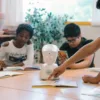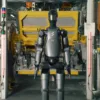Norwegian company 1X has unveiled its latest prototype humanoid robot, Neo Gamma, a household assistant that is expected to perform various household tasks in the future. Its predecessor, Neo Beta, shown last August, already indicated the direction of development, and now an improved version is coming, intended for testing in a home environment.
Neo Gamma – a household assistant – can make coffee, do laundry and vacuum the floor – tasks that may seem simple but are extremely challenging for robots. Despite the progress, this model is still far from commercial use. 1X emphasizes that it will be a long time before humanoid robots actually enter households.

Competition in the field of humanoid robotics
1X is not the only player in this technology industry. Agility Robotics, Apptronik, Boston Dynamics, Figures and Tesla They are already developing similar humanoid robots, but these are mostly intended for use in industry, warehouses, and manufacturing plants. 1X is one of the few companies that focuses on home use, which means a different approach to robot design, functionality and safety.
The development of humanoid robots for households has been an ambitious goal for decades, but so far no solution has proven practical enough. In addition to robotic vacuum cleaners, such as the company's devices iRobot, there is no commercially successful household robot that performs more complex tasks. The reason for this is simple: The technology is not yet at a level that would allow reliable, safe and affordable use in everyday life.
Design focused on safety and interaction
Neo Gamma is not only designed as a functional assistant, but also as a friendly and safe companion in the homeHis body is covered with knitted nylon fabric, which reduces the risk of injury in the event of physical contact with people. The 1X company wants to transcend the image of cold, metal robots, which often cause discomfort.

In addition to physical security, it is also crucial advanced artificial intelligence, which allows the robot to sense its surroundings and prevent accidents. Neo Gamma also has a built-in teleoperation, meaning that a human can take control of the robot in critical moments. While the ultimate goal is complete autonomy, it is currently essential that human control remains part of the safety system.
OpenAI and the vision of embodied artificial intelligence
The 1X company has also become interesting for OpenAI, who is one of its investors. The concept of “embodied intelligence” is becoming increasingly relevant – it is artificial intelligence that does not exist only as software, but also has physical presence in the form of a robot.

OpenAI isn't just investing in 1X, though. It's also investing in a rival company. Figures, and in addition, it is said to be developing in its laboratories own robotic projectsGenerative artificial intelligence is already playing a key role in improving communication between humans and robots, but the question remains how quickly this knowledge can be put into practice.
Will Neo Gamma actually come to homes?
Although Neo Gamma represents an important step in the development of humanoid robots, key questions remain:
- Safety: Robots must be able to operate among humans without risk of injury or destruction of property.
- Reliability: A household robot must be able to consistently perform tasks without constant human intervention.
- The price: If the price is too high, accessibility will be limited to only the wealthiest users.
Currently Neo Gamma is merely a concept that shows the direction of development, but is not yet ready for mass production. The technology required for widespread use of humanoid robots in households has not yet reached the necessary level of maturity.
The question remains: Is Neo Gamma the first step towards the robotic home of the future or just another prototype that will remain in the laboratory?






